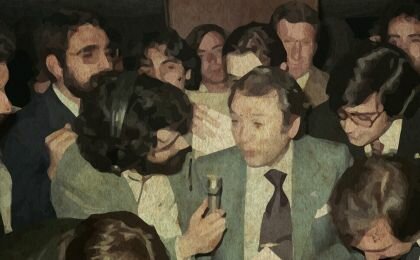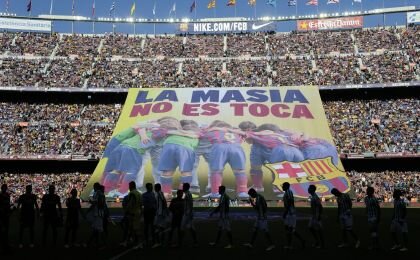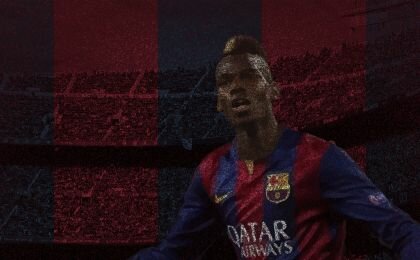 club | 2015-06-30
club | 2015-06-30
Remembering Johan Cruyff
Conceptually, Total Football is the theory that any player can take over the role of any other player in a team. Even though this concept was laid out by Vic Buckingham, Rinus Michels refined this philosophy to what we know today. The system led to Ajax winning three consecutive European Cups (Champions League), something that was only accomplished by Di Stéfano’s Real Madrid and Beckenbauer's Bayern Munich. Why is this important to us? Well, during that magical Ajax run, one player was shining at Ajax and would later become one of the most famous exponents of this great football philosophy. This player was none other than Johan Cruyff. Ajax thrived on his speed and intelligence as a player. He won 19 trophies while also snatched up one Golden Ball (Ballon D’Or). Without a shadow of a doubt, Johan Cruyff was amongst the best footballers in the game which is why Barça wanted him.
“The club was going through a strange period. Even though we were playing well and had good players, we weren’t winning anything, but when Cruyff arrived, in the footballing sense, it was like ‘The Big Bang’ which really reactivated the team” - Antonio de la Cruz.
Johan Cruyff arrived during the first half of the 1973/74 season. Barcelona hadn’t managed to win a League title in 14 years and the club and the city needed an emancipator. Upon his arrival at the club, Cruyff made his debut against Granada at the Camp Nou. Barcelona, second from last, needed a huge boost, and Johan delivered. Two goals and an outstanding performance helped Barcelona beat Granada, and also gave them the momentum and confidence which lead the team to the League title.
On February 17, 1974, Barcelona were to face rivals Real Madrid. One of the biggest football matches in Spain, and undoubtedly in the world. El Clásico has many social, political, and historical agendas. One clear example is Franco versus the Democrats. Spain was still under the reign of Franco, the Spanish dictator, and FC Barcelona and the people of Catalunya weren't having the best of times. People during that era would describe that Franco’s main goal was cultural genocide. He wanted to eradicate the Catalan culture, by any means necessary. People of Catalunya could not write in Catalan, they could not speak in Catalan. The people had their right to free speech and free press ripped from them. It was more than just a match, it was battle, so when Cruyff played at the Bernabéu in 1974, big things were expected.
Mora, Rifé, Costas, De la Cruz, Torres, Juan Carlos, Rexach, Asensi, Cruyff, Sotil, Marcial was the starting lineup for the match. Barcelona pounded Real Madrid five goals to nil, with Johan putting in an exemplary performance, which is probably why it's considered his most recognized match at the club. This victory meant more than just the three points. Things were starting to change in Spain. People could start saying what they felt politically and the victory was very symbolic to the Catalans. The win in the Clasico, in the Capital, and the resounding scoreline sent a huge message around the country and gave the people of Catalunya immeasurable joy.
In 1973 and 1974, he would go on to win two more Golden Balls, making him the first player to ever win it 3 times. While at Barcelona he turned our football into art, and although he only won one League title and one Copa del Rey, the influence he left at the club and in Catalunya will be forever remembered by the fans and by the Catalan people.
Before resuming his playing career with Ajax in 1980, Johan was signed as Ajax’s ‘Technical Advisor,’ but we would go on to witness an event that would change the way people viewed him. On November 30, 1980, Ajax faced Twente in the Dutch League. Leo Beenhakker was the coach at the time, and the match kicked off well for Ajax as they scored the opening goal. However, Twente would go on to score three goals and start to outplay Ajax ,and Beenhakker had no clue on what to do. Cruyff’s job was to advise, not interfere with the game, but he had had enough. He went into the dugout, sat down next to Beenhakker, and started giving out orders. Oddly enough, Ajax managed to turn the game around 5-3. Cruyff would go home as the hero and people had seen for the first time what he could offer as a manager.
Johan Cruyff eventually retired from the game in 1984 and went on to manage Ajax the following year. He would lead Ajax for four years, implementing the style he had learned from Michels. At the back, he had three mobile defenders plus one player, the pivot, that would cover more space. The midfield consisted of two midfielders, who controlled the game by moving the ball from side to side, staying together and creating constantly. Finally, there were two wingers, who hovered the sidelines and opened up the pitch, which would in effect open up the defensive line, and one versatile centre forward. The style was successful, effective and beautiful to watch.
“There is only one ball, so you need to have it” - Johan Cruyff.
This amazing style comprised of one-two’s, triangulations, a dominant midfield, wingers and sometimes over 30 passes before a goal. A style that left fans in awe, and which helped Johan Cruyff and his methodology make their way back to FC Barcelona in 1988.
The Dutchman was critical of the youth development of the club at Barcelona. As a player in 1979, he asked the current president at the time, Josep Lluís Núñez, to establish a similar version of the Ajax Academy at Barcelona. The fruitful grassroots revolution led to dozens of illustrious graduates, such as, Guillermo Amor, Carles Busquets, Albert Ferrer, Josep Guardiola, Óscar García, Sergi Barjuán, Xavi Hernández, Carles Puyol, Víctor Valdés, Andrés Iniesta, Lionel Messi, Cesc Fàbregas, Gerard Pique, Sergio Busquets, and many others, all thanks to Johan. Nothing was more important than club values. He also led to establish a unique model at La Masia followed by the first team, so the youth players could grow up and have a better chance to be part of the senior side, as they would already be accustomed to the style of play.
Johan was loved by the Barcelona fans. He named his first son Jordi, a traditional Catalan name, even though it was not allowed to give such a name to your child at that time. This would further endear him amongst the fans. While at the club, Johan managed to play the type of football he always wanted. He would go on to establish the “Dream Team” which consisted of Catalans, Spaniards and foreigners. Amongst them were Pep Guardiola, José Mari Bakero, Txiki Begiristain, Ion Andoni Goikoetxea, Ronald Koeman, Michael Laudrup, Romário, and Hristo Stoichkov. At Barcelona, the “Dream Team” managed to win four consecutive La Liga titles, one Copa del Rey, three Spanish Super Cups, one UEFA Super Cup, and one UEFA Cup Winner’s Cup whilst thrashing many high profile opponents mesmerizing football along the way. There was the 4-0 victory over Manchester United in the Champions League and the unforgettable 5-0 thrashing of Real Madrid at the Camp Nou.
Cruyff was crucial in Barcelona’s European history. On May 20, 1992, Barcelona played their 3rd European Cup final against Italian side Sampdoria at historic Wembley Stadium. Barcelona would go on to proclaim themselves as European Champions with a 112th minute free kick winner by Ronald Koeman. Cruyff won 11 trophies and became Barcelona's most successful manager at the time only to be surpassed by a fragile little boy more than a decade later.
Halfway through his last season, 1995-96, he was unceremoniously sacked by Núñez. It was a disappointing and disrespectful way to fire the man who was a revered legend at the club as a player and as a manager, a man who had done so much for the club and revolutionized the way we played and viewed football.
Fortunately, he would come back to Barcelona to assist Joan Laporta as an advisor, helping him win the presidential elections, and playing a huge part in bringing key men to the club. These key men were none other than Frank Rijkaard and Pep Guardiola. Rijkaard’s hiring was viewed as quite controversial since his last managerial position saw Dutch side Rotterdam get relegated to the second division in Holland. However, Rijkaard, aided by Ronaldinho, led us to our second European Cup. On May 2008, having just played in a humiliating 4-1 loss against Real Madrid, and with the season coming to a close (an unsuccessful end), Joan Laporta announced that Rijkaard would no longer be the head coach of the first team. Guardiola would succeed him. Pep, who had just promoted the Barcelona B team into the ‘Segunda Division’, was handed the responsibility of becoming FC Barcelona’s manager. Laporta had a say in appointing Guardiola, but it was the faith that Cruyff had in Guardiola that helped convince Laporta. Pep put us on the highest pedestal in world football by helping us win 14 titles in 4 years, and thereby surpassing Cruyff himself. One of Laporta’s final acts as club president was to give Cruyff the title of FC Barcelona's Honorary President.
On June 13, 2010, Sandro Rosell and his board were elected by the Barcelona members. The highest number of votes an FCB President has ever received: over 35,000, 61.35%. Amongst his positions and promises, Sandro Rosell stated the following. “I hold Johan Cruyff in high regard.” Although during the campaign, Rosell declared that Cruyff’s appointment as Honorary President improper according to the club’s laws, and on July 6, 2010, Cruyff decided to return his Honorary President badge at the club’s offices. Thanks to Sandro Rosell, one of the biggest legends the club ever had was thrown aside, with his legacy and contribution ignored.
“I see strange things. What am I referring to? The Qatar deal, for example, when you know that Rosell had or has relations and business and we’re talking about a very rich country. Just look at what he has done to the sections like they don’t matter, and he speaks about how much debt we have and always with this economical topic. What does he want, to someday turn Barça into a private corporation?” - Johan Cruyff (El Periodico, September 5, 2011).
The Dutchman knew the current Barcelona board wanted to turn our club strictly into a business. He warned us about the loss of the club values under Sandro Rosell and his management, which includes our president Josep Maria Bartomeu, whom nobody elected. The latest example being the horizontal stripes in next season's kit. A club that has always used vertical blaugrana stripes is now changing its shirt, changing its identity again to suit money driven decisions after they added Qatar Airways to the front of our shirts.
Cruyff must come back. He is one the few men who can bring back the essence of the old Barcelona. We have not enjoyed the style we have loved to watch ever since Cruyff and the exponents of his style (Guardiola and Tito) have left the club. He turned our football into an art form. He revolutionized everything. He is the expression of our identity.
Johan Cruyff is FC Barcelona.
The views and opinions expressed on this article are of the author only and do not reflect those of Grup 14 or any of its members. The content here belongs to Grup 14 and its many collaborators.









